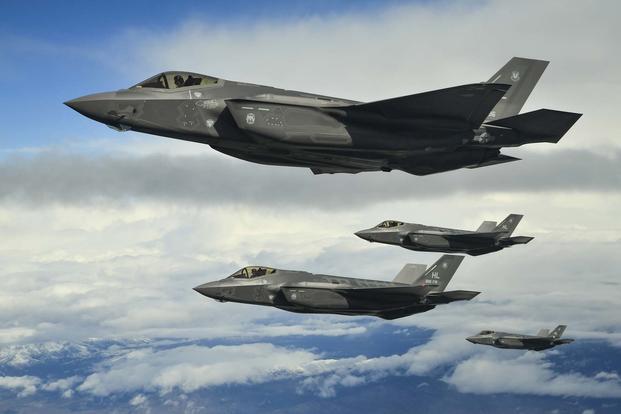The Trump administration is seeking to take billions out of major military aircraft and shipbuilding funds within the recently passed 2020 defense budget, and move that money to the Department of Homeland Security to fund construction of a wall on the southern U.S. border.
A programming transfer request sent to Congress Thursday would cut down programs such as the F-35 Joint Strike Fighter, V-22 Osprey, C-130J cargo aircraft, MQ-9 Reaper drone, P-8A Poseidon surveillance aircraft and landing helicopter assault (LHA) amphibious ship, as well as "miscellaneous equipment" programs for the National Guard and Reserve, according to documents obtained by Military.com. The programming request asks for $3.8 billion in all.
Some of the programs targeted for reduction had been overfunded by Congress at levels above the military's original request.But they also affect key systems, such as the F-35 and P-8, that factor prominently into DoD efforts to counter threats from Russia and China.
In all, the money raided from the Pentagon would end up cutting: two Marine Corps F-35s; two MV-22s; four C-130J Hercules; eight MQ-9 drones; and one Navy P-8 Poseidon -- totalling more than $1 billion.
Related: Air Force to Send More than 100 Planes to Boneyard as it Invests in Future Fighters
The request also removes $156 million in advance procurement for the Air Force's F-35A, as well as $180 million for light attack aircraft efforts. While the Air Force has so far not decided to make light attack a program of record, lawmakers have been particularly interested in boosting experimentation with lighter fixed-wing planes for ongoing counterterrorism operations.
The programs straddle two DoD funding pots: Roughly $2.2 billion from the FY20 defense appropriations base and $1.6 billion from the Overseas Contingency Operations budget.
Last year, the administration diverted or delayed about $3.6 billion from military construction projects in order to fund the border wall, plus another $2.5 billion from military counterdrug programs.
Some lawmakers were quick to oppose the petition.
"President [Donald] Trump has already raided over $6 billion in critical defense funds to pay for his wall -- this new raid worsens the already dangerous problems he's created for our military and national security," Rep. John Garamendi, D-Calif., chairman of the House Armed Services subcommittee on readiness, said in a statement.
"Funding the President's vanity wall in this manner depletes vital resources that maintain our military's readiness to respond to any threats at home and abroad."
Despite opposition, Trump has been resolute in his pursuit of border wall funds.
From Dec. 2018 2018 into early Jan. 2019, disputes between both Democrats and Republicans led to a 35-day government shutdown, resulting in about 800,000 furloughed federal workers. Some were forced to work without pay, including some 50,000 active-duty, Reserve and civilian members of the Coast Guard.
Rep. Thornberry, R-Texas, ranking member of the House Armed Services Committee, said lawmakers spent time and effort to amend and pass the fiscal 2020 budget, which totaled $738 billion for global missions and included funds for the creation of a U.S. Space Force, as well as crucial military family programs.
"Congress has the constitutional responsibility to determine how defense dollars are spent," Thornberry said in a release.
Thornberry said that, while he believes the wall along the U.S.-Mexico border should be funded, the dollars "must come through the Department of Homeland Security rather than diverting critical military resources that are needed and in law."
"We take the Pentagon's recommendations seriously during our deliberations, but the final decisions are contained in the bills passed by Congress and signed into law," he said.
"Once those choices have been made, the Department of Defense cannot change them in pursuit of their own priorities without the approval of Congress. Attempts to do so undermines the principle of civilian control of the military and is in violation of the separation of powers within the Constitution."
-- Oriana Pawlyk can be reached at oriana.pawlyk@military.com. Follow her on Twitter at @oriana0214.
Read More: National Guard Generals: America Needs a Space Guard














